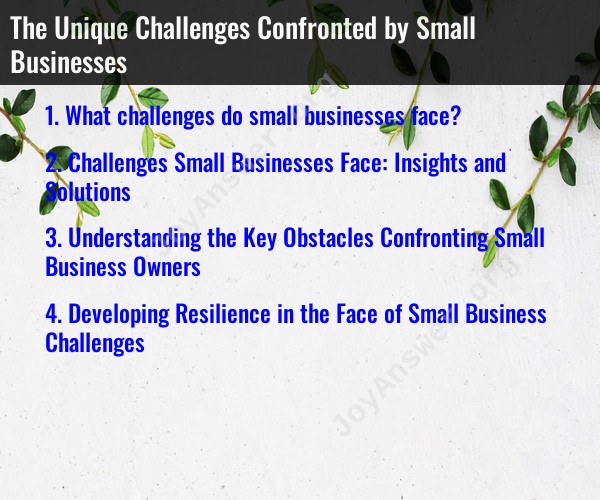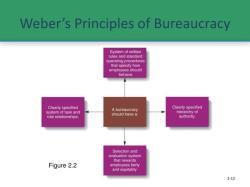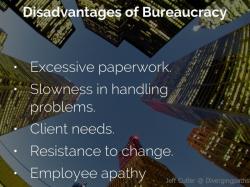What challenges do small businesses face?
Small businesses face a unique set of challenges that can impact their growth, sustainability, and success. These challenges may vary depending on the industry, location, and other factors, but some common hurdles include:
Limited Financial Resources:
- Access to Capital: Small businesses often struggle to secure loans or investments for funding and may have limited working capital.
- Cash Flow Management: Maintaining healthy cash flow can be a constant challenge, with delayed payments and unforeseen expenses.
Market Competition:
- Competing with Larger Businesses: Small businesses often need to compete with larger, well-established competitors that have more resources.
- Differentiation: Finding a unique value proposition or competitive advantage can be challenging.
Marketing and Customer Acquisition:
- Limited Marketing Budget: Small businesses may have constraints on marketing budgets, making it difficult to reach and attract customers.
- Identifying and Reaching the Right Audience: Understanding and effectively reaching target customers can be a hurdle.
Regulatory Compliance:
- Navigating Regulations: Complying with federal, state, and local regulations and licenses can be complex and time-consuming.
- Taxation: Understanding and managing tax obligations is a significant challenge for many small business owners.
Hiring and Workforce Management:
- Finding Skilled Talent: Recruiting and retaining skilled employees can be challenging, especially in competitive job markets.
- Employee Training: Providing training and professional development opportunities is essential but can be resource-intensive.
Technology and Digital Transformation:
- Staying up-to-date with the latest technology and tools can be a significant challenge for small businesses.
- Cybersecurity: Protecting against cyber threats and data breaches is increasingly important but can be daunting.
Supply Chain Disruptions:
- Managing Suppliers: Small businesses can face supply chain disruptions due to factors like disruptions in the global supply chain or changes in supplier relationships.
Healthcare Costs:
- Providing Health Benefits: Offering competitive healthcare benefits to employees while managing costs can be a challenge.
Customer Retention:
- Building Customer Loyalty: Keeping customers engaged and loyal in a competitive market is an ongoing challenge.
- Providing Excellent Customer Service: Maintaining high-quality customer service can be resource-intensive.
Legal and Liability Issues:
- Protecting Intellectual Property: Safeguarding patents, trademarks, and copyrights can be crucial.
- Liability Management: Reducing the risk of legal disputes and liabilities is vital for small businesses.
Scaling and Growth:
- Managing Growth: Scaling a business while maintaining quality and customer satisfaction can be a challenge.
- Access to Expansion Capital: Securing the necessary capital for expansion is often a hurdle for small businesses.
Adapting to Change:
- Economic Fluctuations: Adapting to economic changes, like recessions or industry disruptions, is essential for survival.
Time Management:
- Balancing Responsibilities: Small business owners often wear multiple hats and must find a balance between different roles and responsibilities.
Mental Health and Stress Management:
- Coping with Stress: The stress and demands of running a small business can take a toll on the owner's mental and physical health.
Succession Planning:
- Planning for the Future: Preparing for business succession or exit strategies can be a challenging long-term endeavor.
Small businesses can overcome these challenges through careful planning, resilience, adaptability, and seeking support and resources from organizations, mentors, and networks designed to help small businesses succeed.
Challenges Small Businesses Face: Insights and Solutions
Small businesses are the backbone of the economy, but they also face a number of unique challenges. These challenges can range from access to capital to finding and retaining qualified employees.
Here are some of the most common challenges faced by small businesses, along with insights and solutions:
Challenge: Access to capital
Insight: Small businesses often have difficulty obtaining loans from traditional banks. This is because they are often seen as high-risk borrowers.
Solution: There are a number of alternative financing options available to small businesses, such as microloans, crowdfunding, and invoice financing. Small businesses can also work with a financial advisor to develop a plan to improve their creditworthiness.
Challenge: Cash flow management
Insight: Small businesses often have difficulty managing their cash flow, especially in the early stages. This is because they often have limited resources and may have to wait for customers to pay their invoices.
Solution: Small businesses can improve their cash flow management by creating a budget, tracking their expenses, and sending invoices promptly. They can also offer discounts for early payment and consider using a factoring company to get paid faster.
Challenge: Competition
Insight: Small businesses face competition from larger businesses, both online and offline. This can make it difficult for them to attract and retain customers.
Solution: Small businesses can compete more effectively by focusing on a niche market, offering unique products or services, and providing excellent customer service. They can also use social media and other online marketing tools to reach potential customers.
Challenge: Regulatory compliance
Insight: Small businesses must comply with a number of federal, state, and local regulations. This can be time-consuming and costly.
Solution: Small businesses can get help with regulatory compliance by working with a lawyer or accountant. They can also take advantage of online resources and government programs that provide assistance to small businesses.
Challenge: Attracting and retaining qualified employees
Insight: Small businesses may have difficulty attracting and retaining qualified employees. This is because they often cannot compete with the salaries and benefits offered by larger businesses.
Solution: Small businesses can attract and retain qualified employees by offering a competitive salary and benefits package, creating a positive work environment, and providing opportunities for growth and development. They can also consider partnering with local colleges and universities to recruit students and graduates.
Understanding the Key Obstacles Confronting Small Business Owners
In addition to the challenges listed above, small business owners also face a number of other obstacles, such as:
- Time constraints: Small business owners often have to wear many hats and work long hours. This can make it difficult for them to focus on long-term planning and strategic initiatives.
- Lack of resources: Small businesses often have limited resources, which can make it difficult for them to invest in new technologies and marketing campaigns.
- Uncertainty: Small business owners operate in an uncertain environment, which can make it difficult for them to plan for the future.
Developing Resilience in the Face of Small Business Challenges
Despite the challenges they face, small business owners are often resilient and resourceful. They are able to overcome obstacles and achieve success through hard work and determination.
Here are some tips for developing resilience in the face of small business challenges:
- Stay positive: A positive attitude is essential for overcoming challenges. Small business owners should focus on their successes and learn from their failures.
- Be persistent: Success doesn't happen overnight. Small business owners need to be persistent and never give up on their dreams.
- Seek support: There are a number of resources available to help small business owners succeed. Small business owners can get support from mentors, coaches, and other small business owners.
By overcoming challenges and developing resilience, small business owners can achieve success and build thriving businesses.













